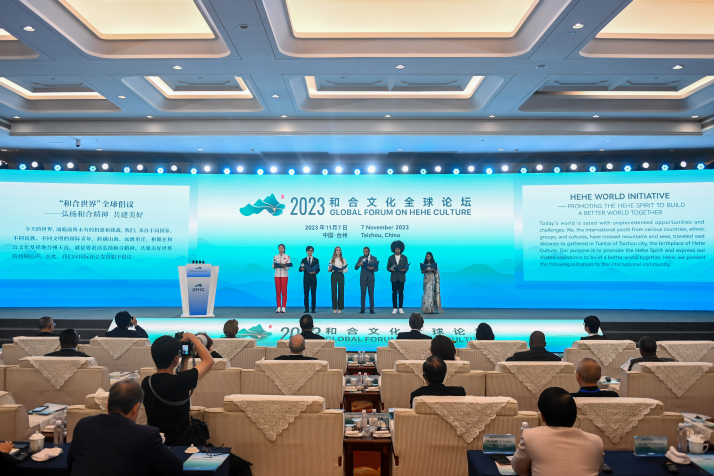| Lifestyle |
| In sync | |
| Harmonious unity, the essence of Hehe culture | |
|
|
 Young participants read out the Hehe World Initiative at the Global Forum on Hehe Culture in Taizhou, Zhejiang Province, on November 7. The initiative calls for promoting harmony and cooperation, and building a better world (XINHUA)
Chinese is a logographic language. Chinese characters not only contain different meanings, but also have profound historical and cultural connotations as carriers of time-honored Chinese civilization. Among these characters, he (harmony) deeply influences the Chinese people. From the culinary art of the "harmonized taste of food cooked in a cauldron" to the view that "harmony in the family leads to prosperity in all undertakings" and the community philosophy of "working together to overcome difficulties," harmony has penetrated the intellectual world and daily life of the Chinese people, and has become an attitude toward life that the Chinese always adhere to and an ideal goal they constantly pursue. Hehe culture, or harmonious unity culture, is one of the essential features of China's traditional culture. President Xi Jinping once summarized this culture in his work Zhejiang, China: A New Vision for Development as follows: "Our ancestors created an incomparable culture, a quintessential part of which is Hehe culture." The book is a collection of essays Xi wrote for a column in the local newspaper Zhejiang Daily between February 2003 and March 2007, when he served as secretary of the Communist Party of China Zhejiang Provincial Committee. Harmonious unity is the core of the Hehe culture. The term Hehe consists of two different characters with the same pronunciation, with the first covering many meanings such as harmony and peace and the second indicating convergence, unity and collaboration. Hehe culture is about harmonious coexistence between humanity and nature and the balanced development of humankind and nature. Its key messages are: l Harmony between nature and humanity. Harmony was the highest value in ancient China. The Book of Changes, a Confucian classic, emphasizes the unity of nature and humanity. Taoism, also known as Daoism, another influential ancient Chinese school of thought, asserts that the Dao (path) follows nature. In other words, human beings should follow the patterns of nature and live in harmony with nature. l Doctrine of the mean. Hehe culture is also reflected in the doctrine of the mean, which holds that when dealing with interpersonal relationships, one should grasp an appropriate degree, avoid extremes and maintain balance. A moderate approach should be adopted when dealing with conflicts, and compromise and cooperation should be sought. l Pursuit of peace. Peace is the basis for human survival and development. Hehe culture emphasizes that humans should abandon violence, war and conflict, and pursue peace and security. It calls for resolving disputes and differences through dialogue, consultation and reconciliation to achieve peaceful coexistence. At the same time, it believes everyone should respect the rights and dignity of others and should not discriminate or exclude. l Tolerance and inclusiveness. Hehe culture attaches great importance to cultural integration and exchange, respects the differences and characteristics of different cultures, and advocates multiculturalism. The inherent openness of Hehe culture contributes to understanding between cultures. Traditional Chinese philosophical concepts, such as Hehe, contain rich wisdom that deserves in-depth studies. By rediscovering this wisdom and adapting it to today's world, we can better meet the challenges of modern society and create a better future. The author is an Iranian researcher with Southwest University in Chongqing Copyedited by Elsbeth van Paridon Comments to taoxing@cicgamericas.com |
|
||||||||||||||||||||||||||||
|
